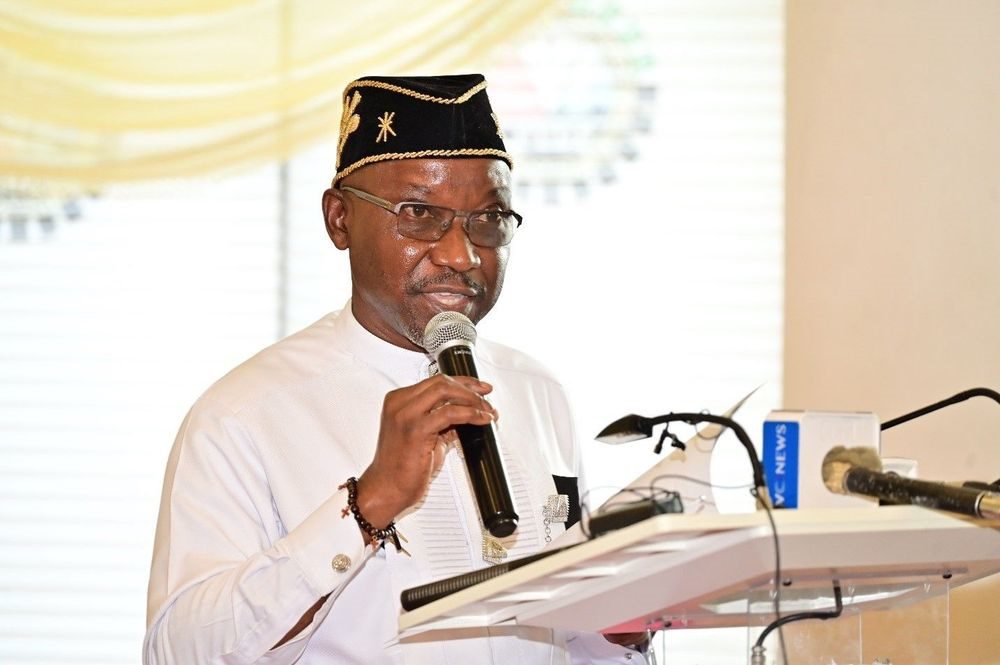…Advocates for natural gas as a key solution into energy transition
By Seun Ibiyemi
The Honourable Minister of State for Petroleum Resources (Gas), Rt. Hon. Ekperikpe Ekpo, has emphasised the crucial role of natural gas in Nigeria’s energy transition. He announced that the forthcoming Gas Sales Purchase Agreement (GSPA) for the Brass Methanol Project will inject $3 billion into Nigeria’s gas industry.
Speaking at the event themed “Gas as Energy Transition Fuel: Navigating Nigeria’s Trilemma of Finance, Energy Security, and International Politics,” Ekpo underscored how natural gas can bridge the gap between immediate energy needs and long-term climate goals.
He highlighted Nigeria’s abundant natural gas resources, which are more environmentally friendly than other fossil fuels.
“Gas offers a significant opportunity to address domestic energy access challenges, power industries, and improve living standards while also meeting global commitments to reduce carbon emissions,” he stated.
Ekpo pointed out that navigating the energy transition in Nigeria requires a careful balance of three key factors: finance, energy security, and international politics.
The Minister acknowledged the financial challenges in developing the gas sector but expressed optimism about recent efforts to unlock investments. “We are making significant strides in unlocking investments.
One major milestone is the forthcoming Gas Sales Purchase Agreement (GSPA) for the Brass Methanol Project, which will inject $3 billion into Nigeria’s gas industry,” he said.
“This investment will not only enhance Nigeria’s position in the global gas market but also stimulate the local economy by creating jobs and expanding our industrial base.”
He continued, “In addition, under my leadership, as contained in the Petroleum Industry Act (PIA) 2021, we have constituted the Midstream and Downstream Gas Infrastructure Fund (MDGIF) to address critical financing gaps in infrastructure development. This will go a long way in ensuring that our gas resources are efficiently harnessed and delivered to the market.”
On energy security, Ekpo stated, “In the gas sector, we have taken important steps to guarantee reliable energy delivery for power generation and industrial use.”
He added, “Just two weeks ago, we concluded the US-Nigeria Strategic Energy Dialogue, where we arrived at key bilateral cooperation which includes: the US Department of State, through its Energy and Mineral Governance Program, committed to renewed technical assistance to further support the Nigerian Government and NNPC in reducing methane emissions from the oil and gas sector.”
He noted that the US Agency for International Development (USAID), through Power Africa, has committed an additional $75-$85 million in technical assistance to bolster energy initiatives in Nigeria.
Discussing partnerships, Ekpo remarked, “The geopolitical landscape plays a critical role in shaping energy policies and trade routes. We are advancing several initiatives to position Nigeria as a major global player in the energy market.”
He highlighted the Nigeria-Morocco Gas Pipeline Project, which will traverse West African countries to deliver gas to Europe, stating, “This project, once completed, will diversify Nigeria’s export routes and enhance regional energy security, ensuring that our gas serves as a catalyst for economic cooperation across Africa and beyond.”
Ekpo also highlighted key achievements in the gas sector, noting, “Under our administration, we have made significant progress in reducing gas flaring and methane emissions.”
He celebrated the NNPC Ltd/TotalEnergies Joint Venture for achieving zero routine gas flaring across all its Nigerian assets, a major milestone in the commitment to achieving net-zero flare gas emissions.
Furthermore, he mentioned the commissioning of several projects, including the AHL Gas Processing Plant, the ANOH Gas Processing Plant, and the ANOH-OB3 Gas Pipeline, stating, “These projects will significantly expand our gas processing and transportation capacity, fueling both domestic and industrial growth.”
To support the energy transition, Ekpo highlighted the deployment of CNG stations across the country through NNPC.
“We have launched the Ride Share CNG Conversion Incentive Programme, alongside the My CNG App, which offers a 50 percent discount for rideshare drivers. This initiative promotes compressed natural gas (CNG) as a cleaner, more affordable fuel option for transportation while reducing the financial burden on drivers and promoting a shift to cleaner fuels.”
He concluded by noting the remarkable progress in commissioning new gas processing facilities, including the 3.1 million metric tonnes per day CNG plant in Ogun State, the 5.2 MMscfd CNG/autogas facility in Lagos, and the 300 MMscf/d Kwale Gas Gathering Hub in Delta State.
“These projects not only boost gas supply but also create jobs, stimulate local economies, and increase access to clean energy,” he affirmed.

